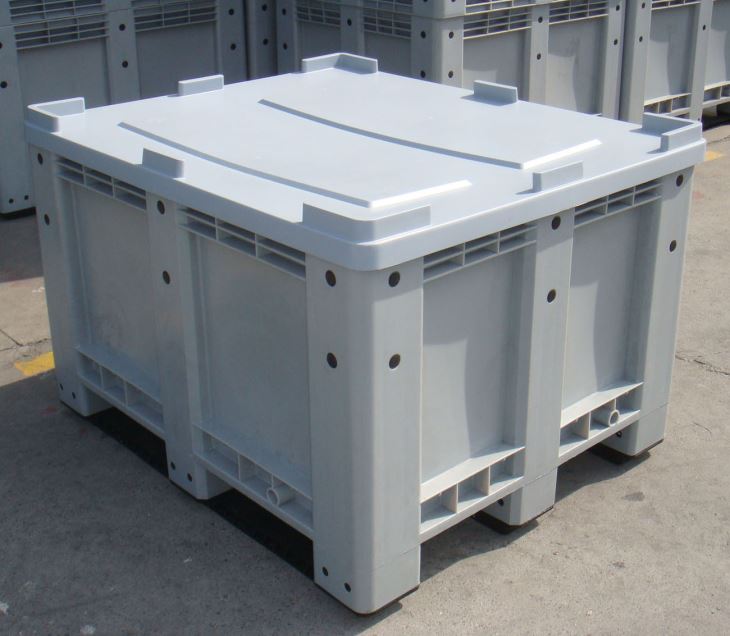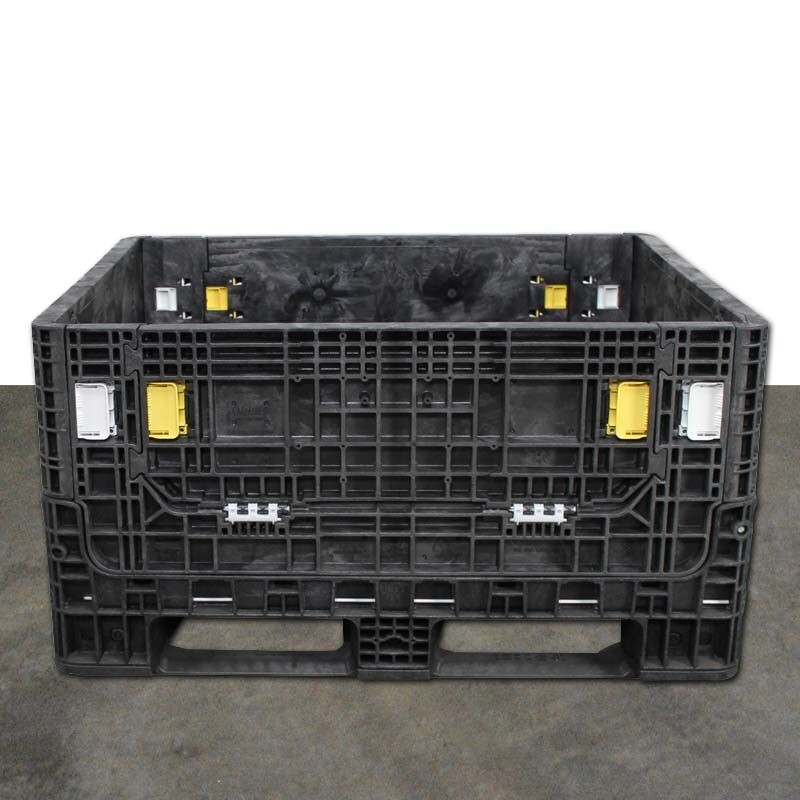The Ultimate Guide to Choosing the Right Bulk Containers for Your Service Demands
Picking the ideal bulk containers is vital for any type of service that counts on effective logistics. Various kinds of containers exist, each created for particular materials and applications. Elements such as dimension, material compatibility, and regulatory criteria play a substantial function in this decision-making procedure. Comprehending these components can bring about boosted operational efficiency. However, several services neglect necessary elements that could improve their overall effectiveness and sustainability. What are these considerations?
Understanding Various Kinds Of Mass Containers
Mass containers act as vital devices for businesses seeking reliable storage and transport services. These containers can be found in different types, each made to meet certain functional demands. One usual kind is the intermediate mass container (IBC), which is suitable for liquid and granulated materials, offering a balance of capability and maneuverability. One more prominent alternative is the bulk bag, or FIBC, ideal for completely dry, flowable items. These flexible containers are lightweight and can be conveniently moved and stored. For larger materials, stiff bulk containers are typically utilized, giving resilience and stability for safe handling. In addition, there are specific containers tailored for hazardous products, making sure compliance with safety policies. Recognizing the distinct qualities of these bulk container types allows businesses to make informed choices that optimize logistics and minimize costs. By picking the appropriate container, business can enhance their functional performance and enhance their supply chain processes.
Trick Material Considerations for Mass Containers
When selecting mass containers, it is vital to ponder the materials made use of in their building and construction. Variables such as stamina, chemical, and resilience compatibility play an essential function in guaranteeing the containers meet certain functional demands. Additionally, weight and transportability problems can affect both effectiveness and transportation logistics.
Product Durability and Stamina
Resilience and toughness are critical aspects in selecting materials for bulk containers, as they directly influence the container's capacity to hold up against different ecological conditions and handling procedures. Materials such as high-density polyethylene (HDPE), polypropylene, and stainless steel are frequently favored for their robust homes, offering resistance to abrasion, impact, and temperature changes. The selection of material additionally impacts the total life expectancy of the container; more powerful materials typically lead to much less frequent replacements, resulting in set you back savings in time. Furthermore, the weight of the material can affect shipping expenses and simplicity of handling. Services have to consider their details functional atmospheres and the capacity for deterioration to ensure peak durability and strength in their mass container option.
Chemical Compatibility Variables
Understanding chemical compatibility is essential for choosing mass containers, as the products used must resist the certain substances they will hold. Various variables affect compatibility, including the chemical nature of the components, temperature, and duration of storage space. Corrosive chemicals might call for containers made from stainless steel or specialized plastics that stand up to degradation. Additionally, responsive materials can produce warm or gases, necessitating aired vent or pressure-rated containers. The option of container material, whether polycarbonate, steel, or polyethylene, ought to straighten with the chemical residential properties of the saved compounds to avoid breaches or leakages. Eventually, a complete assessment of these compatibility factors ensures secure handling and storage, safeguarding both personnel and the atmosphere while preserving item integrity.
Weight and Transportability Worries
Selecting mass containers involves not just evaluating chemical compatibility yet also taking into consideration weight and transportability. Services have to evaluate the convenience of handling and transport to enhance performance. Lightweight materials like high-density polyethylene (HDPE) or light weight aluminum can assist in much easier activity and lower shipping expenses. Alternatively, heavier containers might provide improved longevity yet can prevent mobility, especially in settings calling for constant relocation. Additionally, the design of the container must enable convenient lifting and piling, ensuring ergonomic security for employees. Firms should likewise consider the facilities readily available for transport; for instance, containers suitable with forklifts or pallet jacks can enhance procedures. Ultimately, the ideal equilibrium between weight and mobility directly affects functional efficiency and expense effectiveness.
Sizing Your Mass Containers for Optimum Effectiveness
When sizing bulk containers, organizations must carefully assess the measurements needed to fit their particular items. Additionally, weight capacity is a crucial aspect that influences efficiency and security during transport and storage space. Efficient sizing not just optimizes space but also enhances operational operations.
Establishing Container Capacities
Selecting the best measurements for mass containers is crucial for making the most of efficiency in storage and transport. Organizations have to analyze their details requirements, taking into consideration factors such as available room, the nature of the products being kept, and the approaches of transport made use of. Precise measurements guarantee that containers fit ideally in cars and warehouses, reducing lost area and lowering handling time. Criterion dimensions can use comfort, however custom-made measurements could be essential for distinct demands or to suit details items. Additionally, it is vital to evaluate stacking abilities and accessibility, as these factors influence general functional efficiency. Inevitably, the right dimensions cause boosted organization and streamlined logistics, profiting the total performance of business.
Weight Ability Considerations
Understanding weight capability is vital for companies intending to optimize their mass container performance. The weight capacity of a container directly affects storage space capabilities, transportation logistics, and total operational prices. Selecting containers with the ideal weight limitations ensures that businesses can safely store and deliver their goods without taking the chance of damages or conformity issues. Overloading containers can result in structural failures, while underutilizing ability outcomes in thrown away sources. When picking containers, it is vital for companies to analyze their item weights and consider any type of regulatory requirements. Additionally, factors such as the kind of material, meant usage, and environmental problems need to additionally affect weight capacity choices. By examining these components, services can enhance effectiveness and ensure a streamlined supply chain.
Governing Compliance and Security Requirements

Regulatory compliance and safety criteria play an important duty in the selection of mass containers for organizations. Organizations needs to ensure that their containers meet numerous policies established by regional, nationwide, and worldwide authorities. These standards typically pertain to material security, structural honesty, and proper labeling, which aid stop mishaps and guarantee the safe transport of goods.
In addition, adherence to industry-specific guidelines, such as those from the Fda (FDA) or the Occupational Safety And Security and Health Administration (OSHA), is important for firms dealing with hazardous products or food items. Non-compliance can cause fines, lawful problems, or damage to a service's reputation.
Companies must also consider the container's compatibility with the materials being kept or moved to stay clear of contamination or chain reaction (used plastic containers). To summarize, understanding and executing regulative conformity and security requirements is crucial for the efficient and responsible use mass containers
Sustainability Options for Eco-Friendly Bulk Containers

Business are additionally discovering alternatives made from recycled products, which not just preserve sources however also support the recycling industry. In addition, advancements in design permit lighter containers that require less power to transport, even more enhancing sustainability. By integrating these environment-friendly bulk container options, companies can show their commitment to environmental stewardship while fulfilling consumer need for sustainable methods. This shift not just aids the earth yet can likewise enhance brand name online reputation and customer commitment.
Cost-Effectiveness and Budgeting for Bulk Containers
While numerous organizations concentrate on sustainability, cost-effectiveness stays a crucial aspect when selecting mass containers. Organizations needs to evaluate the first purchase rate, along with long-lasting functional expenses, to assure monetary stability. Factors such as reusability, longevity, and maintenance play a significant duty in identifying overall expenditures.
Buying high-quality containers might generate higher in advance prices however can bring about savings through decreased substitute prices and reduced waste. Additionally, services need to consider transportation prices and storage performance, as these can influence the general budget.

Regularly Asked Concerns
How Do I Establish the Right Container for Hazardous Products?
To determine the ideal container for dangerous products, one have to evaluate compatibility with the material, consider the container's product, check for regulatory compliance, and examine ability and security attributes to ensure appropriate handling and storage.
Can Mass Containers Be Custom-made for Certain Products?
Yes, bulk containers can be personalized for particular products. refurbished bulk containers. Various features, such as material, dimension, and design, can be customized to satisfy one-of-a-kind demands, making sure optimal safety and security and performance for carrying and keeping different items
What Is the Ordinary Life Expectancy of Various Mass Container Types?
The ordinary life-span of mass container types differs; plastic containers last 5-10 years, metal containers 10-20 years, and wood containers normally last 3-7 years, depending on use, upkeep, and ecological problems.
Exactly how Should I Clean and Maintain Bulk Containers?
To clean up and preserve bulk containers, one need to routinely evaluate for damage, remove deposit, laundry with ideal detergents, rinse extensively, and guarantee proper drying before storage. Complying with producer standards enhances durability and safety and security during usage.
Exist Rental Alternatives for Bulk Containers Available?
Yes, various companies supply rental choices for mass containers, providing adaptability for services. These rentals can fit numerous demands, enabling companies to take care of stock effectively without the dedication of buying containers outright.
Longevity and toughness are essential factors in picking materials for mass containers, as they straight influence the container's capacity to withstand different environmental problems and dealing with procedures. Recognizing chemical compatibility is vital for picking mass containers, as the products utilized need to resist the certain materials they will hold. Understanding weight ability is vital for organizations aiming to enhance their bulk container effectiveness. Regulatory conformity and safety standards play an important function in the selection of bulk containers for businesses. While lots of check here services concentrate on sustainability, cost-effectiveness remains an essential aspect when picking bulk containers.